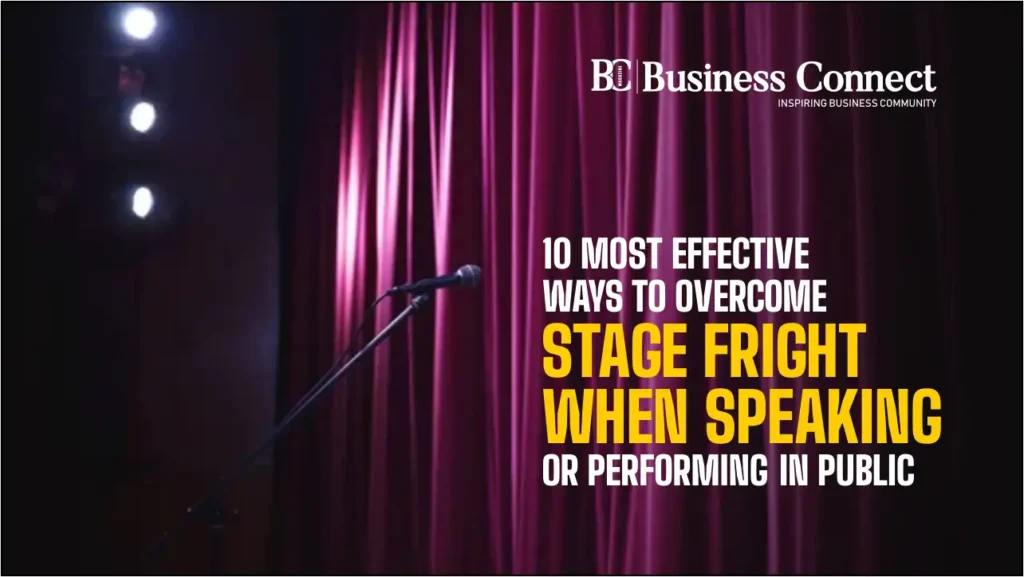10 most effective ways to Overcome Stage Fright When Speaking or Performing in Public
The strong man is not the one who is not afraid, but the one who conquers that fear. – Nelson Mandela
A funny joke describes some people prefer to stay in the bathroom instead of giving a presentation in the office. Many people would agree with this, even if it is an exaggeration. When preparing to speak or perform in front of a group, most of us experience some anxiety. However, persons who experience fear in such situations—or anywhere else where they may be the centre of attention—might be suffering from a sort of social anxiety disorder (also known as social phobia).
Many Americans claim that public speaking is their greatest fear, financial ruin, illness, and even death. Fear of public speaking or performance, often known as stage fright, has a significant impact on self-confidence and self-esteem, pushing some people to drop out of school, quit their work, or pass up a promotion. Many people, especially performers, are terrified. People strive to hide their fear, even from their spouses or other close family members or friends, since they are humiliated.
Stage fright can manifest itself in a variety of ways, including the following:
- Increased heart rate, sweating, upset stomach, chills, headache, and nausea are some of the physiological symptoms.
- Negative thoughts, a fear of failure, perplexity, and a fear of criticism or scorn are examples of cognitive symptoms.
- Long pauses or stillness, stuttering, and a desire to flee the situation are some of the behavioral symptoms.
Cause of Stage Fright
- When you focus continuously on other participants
- Fearing rejection or failure
- Other reasons such as the size of the audience, the importance of the performance, and many more.
- Underestimation of your capabilities
10 Ways to Overcome Stage Fright
01 – Relaxing Your mind and body
There are a few things you may do to calm your body before stepping on stage to overcome stage fright. Relaxing your thoughts and body by releasing stress from your body will help you speak more clearly. Rehearse your lines as much as possible. Don’t get too worked up if you make a mistake on stage! Make it appear as a part of your act. Here are some suggestions for relaxing your body before your performance; –
- Eat fruit before your performance
- Use Chew gum (don’t chew gum too long on an empty stomach)
- Stretching your body
02 – Rehearse as much as you can
Understand your subject, your speech, and, most crucially, your target audience. You have no cause to be afraid if you know your content deeply. Before the performance or public speaking date, you should rehearse as much as possible.
03 – Don’t panic when the situation against you
Something will go wrong sooner or later. Be ready your microphone or projector may stop working. If you’re already familiar with the material, this shouldn’t be a problem. If your microphone, for example, quits working, don’t worry about it; just speak louder. It’s likely that the technical team is already stressed and attempting to solve the problem, so worrying about the same thing won’t help.
04 – Communication with Your Audience
Some people prefer to sit in the crowd and strike up a conversation with strangers to feel more at ease. This will help you moderate your expectations by allowing you to recognize that the audience members are simply regular folks like you. You may also just sit in the crowd as it fills up for a while without revealing your identity — this will only work if you aren’t dressed up.
05 – Don’t share your mistakes
You’ve planned and practiced your speech or presentation, and you’re confident about it. On stage, you suddenly realize you’ve jumbled up the subjects’ order or have forgotten a key point. But keep in mind that you are the only one who is aware of this. Your audience doesn’t. So, don’t make them aware of a blunder they didn’t even realize that. If you bring it up, some individuals may begin seeking other flaws, which may ultimately detract from the main point of your presentation.
06 – Arrive Early
If you arrive late, this will surely increase your anxiousness. Arrive early and familiarize your brain with your surroundings. You may also have a look around the stage and auditorium to get a feel for the place.
07 – Breathing Exercise
You may persuade your body that you’re not in danger by pushing yourself to breathe more slowly and deeply. Inhale deeply, then exhale slowly. Establish a breathing pattern in which your out-breath is twice as long as in-breath. This will automatically help your nervous system to calm and stress-free.
08 – Your Speed Matters
Don’t try to become a teacher, don’t share too much information in your presentation, if it is not interesting. Begin slowly and gradually increase your speed until you reach a comfortable level. You’ll need time to adjust to the audience, and they’ll need time to adjust to you.
09 – Activities to boost confidence
Listen to music, make a phone call to your best friend, do yoga, or go for a run. Do whatever it takes to bring you to a point where you are genuinely happy and at ease. This might help you focus on yourself before a performance and prepare you to execute with confidence and serenity.
10 – Visualizes Your Victory
Concentrate on giving the audience amusement and delight. Imagine the crowd laughing, clapping, and cheering as you close your eyes and take a deep breath. Never think about what may go wrong. Visualize yourself as a winner.



